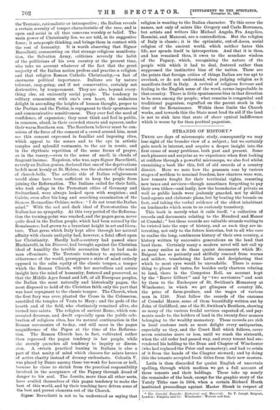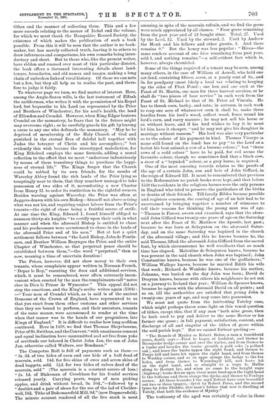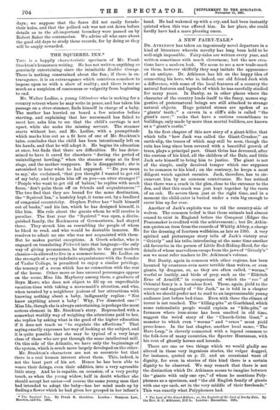STRANDS OF HISTORY.* THESE are days of microscopic study, consequently
we may lose sight of the broader view of a subject ; but we certainly gain much in interest, and acquire a deeper insight into the first cause of many problems, both past and present. Some such pleasure and surprise as we experience when first looking at rotifer through a powerful microscope, we also feel whilst examining a book like this, full of old records of a country district. Here we note how the peasants rose by various stages of serfdom to nominal freedom, how charters were won, how tenants fought for their territorial rights, resenting new taxes and services—though sometimes forgetting to pay their own tithes—and lastly, how the boundaries of private as well as public lands were jealously guarded, not by skilled land-agents and elaborate plans, but by beating the bounds on foot, and taking the verbal evidence of the oldest inhabitant on landmarks which seem to us curiously transitory.
This book is merely what it calls itself, " a collection of records and documents relating to the Hundred and Manor of Crondal ; " but these records are valuable strands waiting to be twisted into the rope of history, and as such they are in- teresting, not only to the future historian, but to all who care to realise the long, continuous history of their own country, a history written by successive generations on the land that bred them. Certainly many a modern novel will not call up as many smiles as do these quaint documents which Mr. Baigent has so patiently and skilfully rescued from worms and mildew, translating the Latin and deciphering that which to most eyes would be unreadable. There is some- thing to please all tastes, for besides early charters relating to land, there is the Compotus Roll, an account kept by the " Reeve Gilbert" and by " two servientes " and sent by them to the Exchequer of St. Swithun's Monastery at Winchester, in which we get glimpses of country life, the price of farm-produce, and the wages of various men in 1248. Next follow the records of the customs of Crondal Manor, some of them beautifully written out by John of Guildford, one of the St. Swithun's Brothers, showing us many of the various feudal services expected of, and pay- ments made to, the holders of land in the twenty-four manors belonging to the wealthy monastery. These records are rich in local customs such as must delight every antiquarian, especially as they, and the Court Roll which follows, cover seven centuries more or less, until we reach the sixteenth, when the old order had passed way, and every tenant had sur- rendered his holding to the Dean and Chapter of Winchester (who had replaced the Prior and monastery), and had re-seisin of it from the hands of the Chapter steward ; and by doing this the tenants accepted fresh titles from their new masters.
Latin is then discarded for quaint English of uncertain spelling, through which medium we get a full account of these tenants and their holdings. These take up nearly the remainder of the book, except for the graphic story of the Yately Tithe case in 1604, when a certain Richard Heath instituted proceedings against Master Shonk in respect of
• The Crondal Records: Historical and Manorial. By F. Joseph Baigent. London Simpkin and Co. Winchester : Warren and Son.
tithes and the manner of collecting them. This and a few more records relating to the manor of Itchel end the volume, for which we must thank the Hampshire Record Society, the existence of which makes the publication of such a book possible. From this it will be seen that the author is no book- maker, but has merely collected truth, leaving it to others to draw inferences and comparisons, his own remarks being intro- ductory and short. But to those who, like the present writer, have ridden and roamed over most of this particular district, the book offers a thousand interesting details about land- tenure, boundaries, and old names and usages, making a long chain of unbroken links of rural history. Of these we can note but a few, but they all help us to realise the past, and there- fore to judge it fairly.
To whatever page we turn, we find matter of interest. Here, among the Anglo-Saxon wills, is the last testament of Elfeah the earldorman, who writes it with the permission of his Royal lord, but bequeaths to his Lord (as represented by the Prior and Brothers of Winchester), for his soul's health, the land of Ellendon and Crondal. However, when King Edgar bestows Crondal on the monastery, he fears that in the future might may overcome right ; so he carefully guards his gift by leaving a curse to any one who defrauds the monastery. "May he be deprived of membership of the Holy Church of God and punished in the eternal fires of doleful hell together with Judas the betrayer of Christ and his accomplices ;" but evidently this wish became the stereotyped malediction, for King Ethelred employs the same formula, adding a moral reflection to the effect that we must "endeavour industriously by means of these transitory things to purchase the happi- ness of eternal life." The Kings forgot that the Church could be robbed by its own friends, for the monks of Waverley Abbey found the rich lands of the Prior lying so temptingly near to them, that they somehow managed to take possession of two sides of it, necessitating a new Charter from Henry II. to order its restitution to the rightful owners. Besides warring against Waverley, the Prior was often at daggers-drawn with his own Bishop—himself not above seizing what was not his, and requiring unjust labour from the Prior's tenants—the right of chase being a fruitful source of strife. At one time the King, Edward I., found himself obliged to summon thirty-six knights " to certify upon their oath in what manner and when the aforesaid Bishop is entitled to chase and his predecessors were accustomed to chase in the lands of the aforesaid Prior and of his men." But at last a quiet settlement follows between "the Lord Bishop, John de Pontis- sara, and Brother William Basynges the Prior, and the entire Chapter of Winchester, so that perpetual peace should be established between them,"—the word "perpetual," then as now, meaning a time of uncertain duration !
The Priors, however, did not show mercy to their own tenants, whose complaints appear written in Norman-French, " Depar le Roy," resenting the dues and additional services, which, it must be remembered, were often extremely incon- venient when exacted by the man the complainants call" notre cher in Dieu le Priour de Wyncester." This appeal did not stop the exactions, and the King's scribe writes again (1364) : —" Your men of Crundel which, as is said is of the ancient Demesne of the Crown of England, have represented to us that you exact from them other customs and other services than they are bound to perform, and their ancestors, tenants of the same manor, were accustomed to render at the time when that manor was in the bands of our progenitors, late Kings of England." It is difficult to realise how long serfdom continued. Here in 1418, we find that Thomas Shryebourne, Prior of St. Swithun, and the Convent," with unanimous consent and equal inclination have manumitted and set free from yoke of servitude our beloved in Christ John Jan, the son of John Jan, otherwise called Walters, our Bondman."
The Compotus Roll is full of payments such as these :- " 3s. 3d. of two bides of oxen and one hide of a bull dead of murrain, sold. 14d. for five skins of ewes and seven skins of dead haggets, sold. 5d. for two bides of calves dead of the murrain, sold " (The murrain is a constant source of loss.) " 2s. ld. of Blakeman of Crookham for his feudal services released yearly. Carrying peats, wages of men picking apples, and drink without bread, 3s. 10d.,"—followed by a " doublet and a pair of shoes for the use of the lad of Chelder- wel1,18d. Tithe of Dokemarefeld Mill, 9d." (now Dogmersfield). The minute account rendered of all the live stock is most amusing, in spite of the murrain refrain, and we find the geese were much appreciated by all classes. " Four geese remaining from the past year and of 24 bought since. Total, 27. Used by the Lord, 12. Used by the steward, 2. Used by Andrew the Monk and his fellows and other guests, 4. And there remains 9." But the honey was less popular : " Hives—the same renders account of one hive remaining front past year, sold 1, and nothing remains,"—a self-evident fact which is, however, always chronicled.
Some of the things required of a tenant may be seen, among many others, in the case of William of Aswell, who held one cot-land, containing fifteen acres, at a yearly rent of 8s., and 3s. for pondpany (most likely a local tax relating to keeping up the sides of Fleet Pond) ; one hen and one cock at the Feast of St. Martin, one man for three harvest services, or he shall do "two pieces of base service" in each week from the Feast of St. Michael to that of St. Peter ad Vincula. He has to thresh corn, barley, and oats ; in autumn, in each week to reap one acre of whatsoever corn it shall be, make three hurdles from his lord's wood, collect wood, fence round his lord's corn, and carry manure ; he may not sell his horse or ox without leave, and if his lord wishes to buy it he must let him have it cheaper, "and he may not give his daughter in marriage without ransom." His lord was also very particular as to the colour of his payment in kind. Thomas Vicarye (a name still found on the land) has to pay " to the Lord as a heriot his best animal, a cow of a browne colour;" but " three cows of a redd colour " have to be paid, for red seems the favourite colour, though we sometimes find that a black cow, a steer of a " brynded " colour, or a grey horse, is required.
One of the most amusing records relates to the proofs of the age of a certain John, son and heir of John Gifford, in the reign of Edward III. It must be remembered that previous to the Reformation no parish books were kept, and that before 1538 the residents in the religious houses were the only persons in England who tried to preserve the particulars of the births or deaths of their friends. Till family Bibles became possible and registers common, the coming of age of an heir had to be ascertained by bringing together a number of witnesses to tell their reasons for thinking the young man was of age.
" Thomas le Forcer, sworn and examined, says that the afore- said John Gifford was twenty-one years of age on the Saturday next after the Feast of Sc. Matthew the Apostle, last past ; because he was born at Scheynton on the aforesaid Satur- day, and on the same Saturday was baptised in the church of the aforesaid village; and this he knows because he, the said Thomas, lifted the aforesaid John Giffard from the sacred font, by which circumstance he well recollects that so much time has elapsed. Malculine de Scheynton knows, because he was present in the said church when John was baptised ; John Constantine knows, because he was one of the godfathers ;"
William Walleye knows, because he married Edith his wife that week ; Richard de Wenloke knows, because his mother, Johanna, was buried on the day John was born ; David de Drayton knows, because with others his neighbours he set out
on a journey to Ireland that year; William de Spencer knows, because he agrees with the aforesaid David on all points ; and
so on, till the authorities are satisfied that young John is twenty-one years of age, and may come into possession.
We must not quote from the interesting Yateley case, which might perhaps throw some light on this vexed question
of tithes, except this, that if any man " hath nine geese, then he hath used to pay and deliver to the same Rector or his farmer one goose ; in full payment, satisfaction, content, and discharge of all and singular of the tithes of geese within the said parish kept." But we cannot forbear quoting :—
" The Bounds of Mynley as Robert Baker, a man a hunddorid years, douth saye :—First to begen at Ludshut, and thence to Bromysshe hedge corner and over the wafter, and from thence to a bushe and besydes the bushe grouith a pold ooke [a pollard oak], and leave the bushe uppon the right hand, and thence to Penye hill and leave hit uppon the right hand, and from thence to Westley corner, and so on uppe alonge the hedge to the fox holes, and from thence to Wyendmyll hill, and leave hit on the right hand, and so straight to a waye to Hanle along to Hornyn lye, and when ye come to the heyght ways [highway] tome downs upon three acres bred upon the right hand to the bottome and there alonge the dyche, and thence to Foxleye corner. All these boundes I the sayd Robert have seen bounddid out two or three tymyes,—fyrst by Robert Peres, and the secund tyme by John Flodder, this man's father that now is dwelling at Yately, that hath the evidence of Mynley."
The testimony of the aged was certainly of value in those
days ; we suppose that the foxes did not easily forsake their holes, and that the pollard oak was not cut down before details as to the all-important boundary were passed on by Robert Baker the centenarian. We advise all who care about the good old days to study these records, for by doing so they will be amply rewarded.




















































 Previous page
Previous page